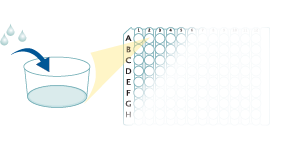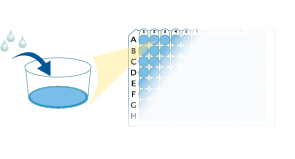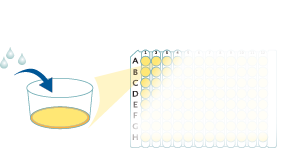Human SOST/Sclerostin Quantikine ELISA Kit Summary
Product Summary
Recovery
The recovery of SOST spiked to levels throughout the range of the assay in various matrices was evaluated.
| Sample Type | Average % Recovery | Range % |
|---|---|---|
| Cell Culture Media (n=4) | 100 | 91-111 |
| EDTA Plasma (n=4) | 95 | 89-101 |
| Heparin Plasma (n=4) | 100 | 91-108 |
| Serum (n=4) | 96 | 86-112 |
Linearity
Scientific Data
Product Datasheets
Preparation and Storage
Background: SOST/Sclerostin
SOST, also known as Sclerostin, is a Cerberus/DAN family BMP antagonist and is an important regulator of bone homeostasis. Inactivating mutations in the SOST gene can cause sclerosteosis and van Buchem disease. SOST is expressed by terminally differentiated cells embedded in mineralized matrix including osteocytes, hypertrophic and prehypertrophic chondrocytes, and tooth cementocytes. Its expression is induced by BMP-2, -4, and -6 and is inhibited by parathyroid hormone (PTH). Its downregulation in osteocytes by physical loading of bone contributes to the mechanical sensor function of osteocytes and the subsequent increase in bone growth. SOST binds to BMP-2, -4, -5, -6, and -7 and inhibits the osteogenic differentiation induced by these BMPs. It inhibits canonical Wnt signaling by binding to LRP-5 and LRP-6 and inhibiting their association with Frizzled receptors. SOST reduces the proliferation of mesenchymal stem cells (MSC) and induces MSC apoptosis. Circulating levels of SOST are elevated in pathologies with bone involvement including low bone mineral density, Paget’s disease, multiple myeloma, and prostate cancer with bone metastases. It is also elevated in advanced chronic kidney disease, alcoholic liver disease, type 2 diabetes, and patients with increased abdominal and gynoid fat.
Assay Procedure
Refer to the product- Prepare all reagents, standard dilutions, and samples as directed in the product insert.
- Remove excess microplate strips from the plate frame, return them to the foil pouch containing the desiccant pack, and reseal.
- Add 100 µL of Assay Diluent to each well.
- Add 50 µL of Standard, control, or sample to each well. Cover with a plate sealer, and incubate at room temperature for 2 hours on a horizontal orbital microplate shaker.
- Aspirate each well and wash, repeating the process 3 times for a total of 4 washes.
- Add 200 µL of Conjugate to each well. Cover with a new plate sealer, and incubate at room temperature for 2 hours on the shaker.
- Aspirate and wash 4 times.
- Add 200 µL Substrate Solution to each well. Incubate at room temperature for 30 minutes on the benchtop. PROTECT FROM LIGHT.
- Add 50 µL of Stop Solution to each well. Read at 450 nm within 30 minutes. Set wavelength correction to 540 nm or 570 nm.





Citations for Human SOST/Sclerostin Quantikine ELISA Kit
R&D Systems personnel manually curate a database that contains references using R&D Systems products. The data collected includes not only links to publications in PubMed, but also provides information about sample types, species, and experimental conditions.
12
Citations: Showing 1 - 10
Filter your results:
Filter by:
-
Serum granulocyte-macrophage colony-stimulating factor (GM-CSF) is increased in patients with active radiographic axial spondyloarthritis and persists despite anti-TNF treatment
Authors: C Papagoras, S Tsiami, A Chrysantho, I Mitroulis, X Baraliakos
Arthritis Research & Therapy, 2022-08-16;24(1):195.
Species: Human
Sample Types: Serum
-
Targeting loop3 of sclerostin preserves its cardiovascular protective action and promotes bone formation
Authors: Y Yu, L Wang, S Ni, D Li, J Liu, HY Chu, N Zhang, M Sun, N Li, Q Ren, Z Zhuo, C Zhong, D Xie, Y Li, ZK Zhang, H Zhang, M Li, Z Zhang, L Chen, X Pan, W Xia, S Zhang, A Lu, BT Zhang, G Zhang
Nature Communications, 2022-07-22;13(1):4241.
Species: Mouse, Rat
Sample Types: Serum
-
Baseline serum biomarkers of inflammation, bone turnover and adipokines predict spinal radiographic progression in ankylosing spondylitis patients on TNF inhibitor therapy
Authors: J Rademacher, M Siderius, L Gellert, FR Wink, M Verba, F Maas, LM Tietz, D Poddubnyy, A Spoorenber, S Arends
Seminars in arthritis and rheumatism, 2022-02-02;53(0):151974.
Species: Human
Sample Types: Serum
-
Assessment of Serum sRANKL, sRANKL/OPG Ratio, and Other Bone Turnover Markers with the Estimated 10-Year Risk of Major and Hip Osteoporotic Fractures in Rheumatoid Arthritis: A Cross-Sectional Study
Authors: CA Nava-Valdi, JM Ponce-Guar, AM Saldaña-Cr, EG Corona-San, M Ramirez-Vi, EE Perez-Guer, JD Murillo-Sa, B Contreras-, ML Vazquez-Vi, F Gonzalez-P, D Bonilla-La, H Jacobo-Cue, JD Centeno-Va, G Echeverria, S Cerpa-Cruz, MF Alcaraz-Lo, EG Cardona-Mu, M Salazar-Pa, L Gonzalez-L, JI Gamez-Nava
BioMed Research International, 2021-08-30;2021(0):5567666.
Species: Human
Sample Types: Serum
-
Comparison of insulin-like growth factor-1 and sclerostin levels between premenopausal women with and without diabetes mellitus
Authors: M Sylvawani, B Setyohadi, D Purnamasar, M Abdullah, MR Kurniawan
Journal of Taibah University Medical Sciences, 2021-06-11;16(5):719-723.
Species: Human
Sample Types: Serum
-
Sclerostin inhibits Wnt signaling through tandem interaction with two LRP6 ectodomains
Authors: J Kim, W Han, T Park, EJ Kim, I Bang, HS Lee, Y Jeong, K Roh, J Kim, JS Kim, C Kang, C Seok, JK Han, HJ Choi
Nat Commun, 2020-10-23;11(1):5357.
Species: Human
Sample Types: Cell Culture Supernates
-
Differences in Osteoimmunological Biomarkers Predictive of Psoriatic Arthritis among a Large Italian Cohort of Psoriatic Patients
Authors: M Diani, S Perego, V Sansoni, L Bertino, M Gomarasca, M Faraldi, PDM Pigatto, G Damiani, G Banfi, G Altomare, G Lombardi
Int J Mol Sci, 2019-11-10;20(22):.
Species: Human
Sample Types: Serum
-
Response of Sclerostin and Bone Turnover Markers to High Intensity Interval Exercise in Young Women: Does Impact Matter?
Authors: R Kouvelioti, N Kurgan, B Falk, WE Ward, AR Josse, P Klentrou
Biomed Res Int, 2018-11-01;2018(0):4864952.
Species: Human
Sample Types: Serum
-
Negative Association Between Sclerostin and INSL3 in Isolated Human Osteocytes and in Klinefelter Syndrome: New Hints for Testis-Bone Crosstalk
Authors: A Di Nisio, L De Toni, MS Rocca, M Ghezzi, R Selice, G Taglialavo, A Ferlin, C Foresta
J. Clin. Endocrinol. Metab., 2018-05-01;0(0):.
Species: Human
Sample Types: Serum
-
Wnt Signaling-Related Osteokines at Rest and Following Plyometric Exercise in Prepubertal and Early Pubertal Boys and Girls
Authors: P Klentrou, K Angrish, N Awadia, N Kurgan, R Kouvelioti, B Falk
Pediatr Exerc Sci, 2018-04-23;0(0):1-9.
Species: Human
Sample Types: Serum
-
Correlation of blood bone turnover biomarkers and Wnt signaling antagonists with AS, DISH, OPLL, and OYL
Authors: CC Niu, SS Lin, LJ Yuan, LH Chen, CY Yang, AN Chung, ML Lu, TT Tsai, PL Lai, WJ Chen
BMC Musculoskelet Disord, 2017-02-02;18(1):61.
Species: Human
Sample Types: Serum
-
Hormonal and systemic regulation of sclerostin
Authors: Matthew T Drake
Bone, 2016-12-10;0(0):.
Species: Human
Sample Types: Serum
FAQs
No product specific FAQs exist for this product, however you may
View all ELISA FAQsReviews for Human SOST/Sclerostin Quantikine ELISA Kit
There are currently no reviews for this product. Be the first to review Human SOST/Sclerostin Quantikine ELISA Kit and earn rewards!
Have you used Human SOST/Sclerostin Quantikine ELISA Kit?
Submit a review and receive an Amazon gift card.
$25/€18/£15/$25CAN/¥75 Yuan/¥2500 Yen for a review with an image
$10/€7/£6/$10 CAD/¥70 Yuan/¥1110 Yen for a review without an image




